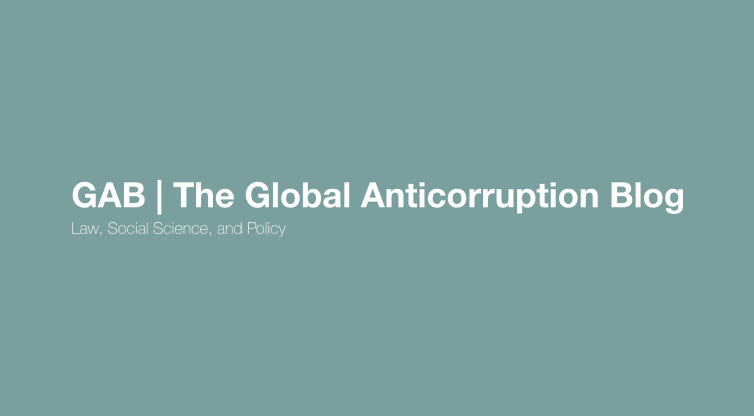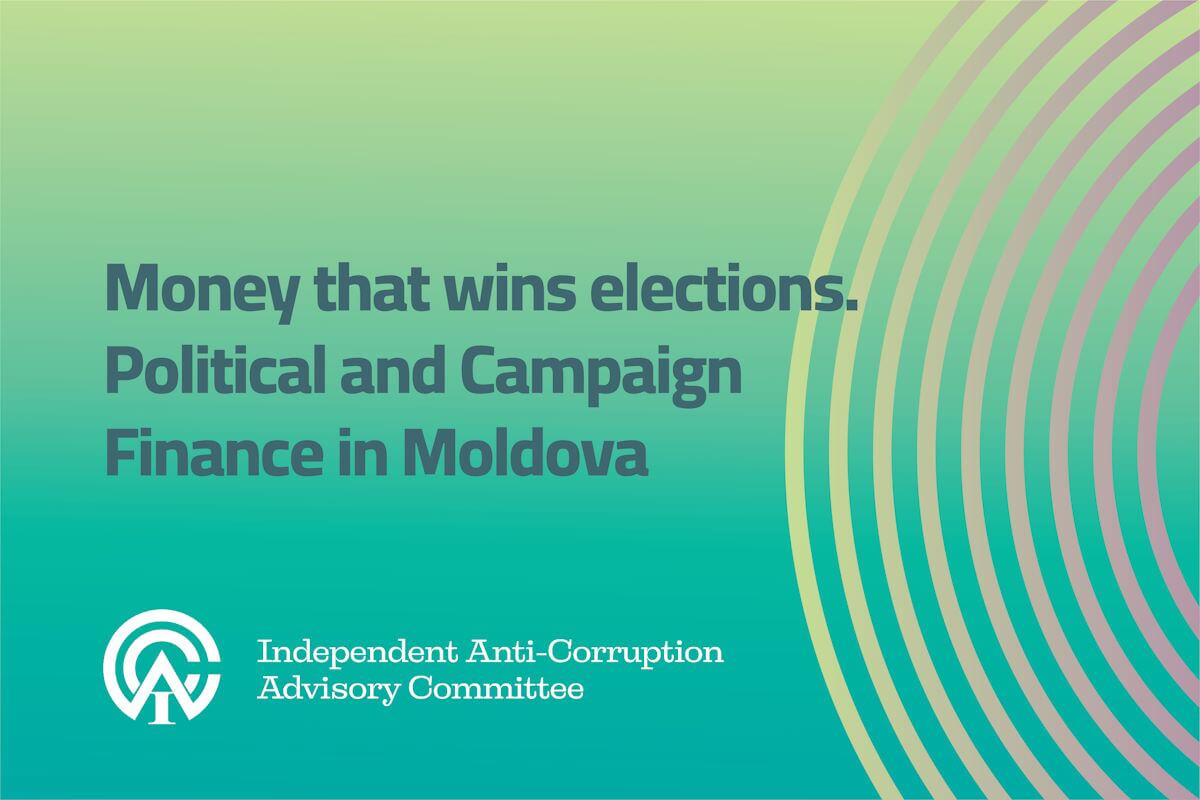Today’s Guest Post is submitted by Dumitrita Bologan on behalf of Moldova’s Independent Anti-Corruption Advisory Committee (CCIA). The CCIA is a corruption watchdog agency with members drawn equally from Moldovan civil society and the international community. Established by presidential decree in 2021, it recommends measures to bolster Moldova’s fight against corruption and periodically reports on their implementation. The post below is drawn from its latest report, “Disrupting Dysfunctionality”: Resetting Republic of Moldova’s Anti-Corruption Institutions. While specific to Moldova, the issues it raises about coordination between law enforcement agencies and the need for judicial reform will be familiar to those working in other countries and the insights about how to address the problems of value to many.
The Republic of Moldova has been struggling with corruption for years, it being acknowledged as a main obstacle to development. The relevant stakeholders have implemented a wide range of measures to prevent and fight corruption, but they have neither been accompanied by coherent policies nor strict adherence by all parties. As a result, they have often been ineffective, insufficient, and poorly executed.
As Disrupting Dysfunctionality shows, the weakest point has been the reform of justice institutions. Reforms initiated in 2011 produced modest results despite considerable investments and support from development partners, and these efforts suffered significant setbacks during the years 2016 – 2019 when elites captured state institutions. While some advances have been realized since, the impact has yet to be felt.
Disrupting Dysfunctionality examines the institutional architecture of the principal justice agencies with an anticorruption and integrity mandate in the Republic of Moldova: The Anticorruption Prosecutor’s Office (APO), the National Anticorruption Centre (NAC), the Criminal Asset Recovery Agency (CARA), the National Integrity Authority (NIA), the Financial Intelligence Unit (FIU), and the judiciary. The report also assesses these agencies’ performance using information on staffing levels, analyses by civil society organizations, data on citizen perceptions, and the perceptions and experiences of leaders and staff members of the various institutions.
The main issue is vaguely defined boundaries between agencies with, as a consequence, poor relations among working-level staff. The report recommends greater clarity in the agencies’ mandates based on the nature and seriousness of the misconduct. The key to such administrative reforms is a thorough grasp of the details. In Moldova they are:
- weak inter-institutional cooperation within the country, as well as cooperation with other countries and specialized international organizations in investigating corruption and asset recovery;
- institutional weakness of APO and NAC;
- lack of a properly functioning APO due to an improperly defined and inadequate mandate, limited functional, operational, and financial independence as well structural tensions between APO and NAC, at the level of their leaders and staff;
- strong and destructive dependency of APO on the Prosecutor General (PG) and his/her office;
- different prosecutors working on the same case in APO from the pre-trial phase to court examination (at different court levels, the same case is taken by other prosecutors than APO ones);
- insufficient number of investigative officers, criminal investigation officers and support staff in APO (e.g., subject matter specialists and interpreters/translators);
- information leaking from the APO and NAC in high-profile cases;
- little if any formal consideration by the law enforcement institutions under review to their own strategic development, effective risk management, and ways to improve or streamline their activity;
- investment of too much effort and resources of NAC in an ineffective corruption prevention function (its role in review of legislation from the anti-corruption perspective takes time and effort which should be focused on investigating corruption);
- NAC’s mechanism of integrity testing of individuals and institutions has had little positive impact (at the same time, its abuse, real or perceived, raises serious concerns as to its continued practice);
- lack of CARA’s mandate to carry out financial investigations post-sentence;
- delays in verifying and sanctioning breaches of the assets and interests’ disclosure by the NIA (its methodology for asset verification is poor, as is court practice with respect to the burden of proof and standards for justifying questionable wealth);
- lack of a clear strategy of NIA in prioritizing high level officials and cases with significant discrepancies between the declared and the de facto wealth of the declarants;
- poor and insufficiently analyzed annual reports and statistics of APO, NAC and NIA making them incomprehensible to the wider public;
- insufficient remuneration of the staff of APO, NAC, CARA, and NIA (this leads to low morale and excessive, chronic turnover of personnel, understaffing, and the loss of expertise, experience and institutional memory);
- courts’ selectivity in holding public hearings in high-profile cases (this lack of transparency lends itself to a climate of suspicion of judges, including that the wealthy or politically connected receive special treatment);
- lack of consistency of integrity issues.
The report provides 52 separate recommendations addressed to Parliament, the APO, NAC, CARA, NIA, and the courts.
The main ones involve redesigning the institutional set-up of APO and strengthening its institutional and operational independence. APO should focus on criminal investigation of high-level corruption, including solely conducting criminal investigation and presenting the charges in all levels of the courts. This means that APO should have all the necessary resources for conducting criminal investigation independently, including competences and human resources for conducting special investigative measures and analytical work to effectively exercise its mandate. Legislative and operational changes to implement these recommendations should be carried out in three months.
The report recommends that NAC’s mandate be limited to investigating systemic and, for a transitional period, petty corruption, while other functions such as prevention/awareness raising, anti-corruption review and institutional integrity evaluation be removed from its mandate. Within 24 months, NAC should assess what constitutes petty corruption in Moldova’s context and present to Parliament a clear delineation between systemic and petty corruption to enable the latter to amend the legislation, accordingly, assigning petty corruption to the Ministry of Internal Affairs for investigation.
CARA should have in its mandate the competence to carry out financial investigations during court examination and post-sentence. CARA should remain under NAC for up to two years, subject to an independent assessment of its status and performance.
NIA should better define and improve the methodology on asset verification and develop and improve verification capabilities with the aim of reaching the ability to verify in-depth a minimum of 10% of the total number of declarations per year.
Courts should hold public court hearings in all high-profile cases, with exceptions made only under circumstances required by law and in conformity with the established procedure. They should ensure a unified caselaw on integrity issues that is consistent with relevant international standards.
The report recommends that all institutions covered by the report prioritize improving cooperation with all relevant national institutions by developing guidelines for cooperation to help them implement their mandate in an effective manner. All institutions with primary anticorruption mandate should seek to improve their abilities to cooperate with other countries and specialized international organizations such as EUROJUST to effectively carry out their mandate.
The CCIA will monitor the implementation of these recommendations and follow-up with reports on their implementation level. For questions about the report or the CCIA’s activity, contact contact@ccia.md. CCIA Facebook and LinkedIn pages report the latest developments.
Source: https://globalanticorruptionblog.com/2023/01/11/moldovas-fight-against-corruption-reset-needed/





